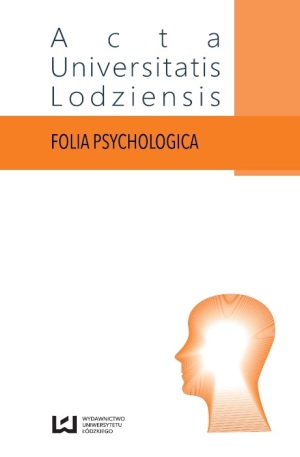EDYNBURSKA SKALA DEPRESJI POPORODOWEJ – WŁAŚCIWOŚCI PSYCHOMETRYCZNE I CHARAKTERYSTYKA
EDINBURGH POSTNATAL DEPRESSION SCALE – PSYCHOMETRIC PROPERTIES AND CHARACTERISTICS
Author(s): Karolina KossakowskaSubject(s): Psychology
Published by: Wydawnictwo Uniwersytetu Łódzkiego
Keywords: postpartum depression; diagnosis; psychometric properties; Edinburgh Postnatal Depression Scale (EPDS).
Summary/Abstract: Objectives: estimation of psychometric properties of the Polish version of the Edinburgh Postnatal Depression Scale (EPDS) to recognize the symptoms of postpartum depression. Material and methods: The study was conducted from 2007 to 2011. One hundred twenty six women after childbirth were examined. The mean age was 28,34 years (SD = 3,96). The Scale was administered between the 4th and 12th weeks after delivery (M = 6,56 weeks; SD = 2,14) to mothers, recruited previously at the gynecological clinics and prenatal classes. All participants were submitted to a structured interview for postpartum depression diagnosis. Participants completed Polish version of EPDS and Beck Depression Inventory (BDI) to verify the reliability and validity of the Polish version of EPDS. To assess psychometric properties of the scale, descriptives statistics, independent and dependent t-test, Cronbach’s alpha, Pearson’s correlation, exploratory factor analysis (with KMO-test) were conducted. The scale sensitivity and specificity were calculated, and the receiver operating characteristic (ROC) curve was used to find the best cut-off point. Results: Using the factor analysis two factor were extracted, which accounted for 68,5% of the variance. Cronbachʼs alpha coefficient for the entire scale is high and amounts to 0,91. Stability factor estimated by test-retest was 0,761 (p < 0,05). Total scores of EPDS correlated significantly with the results of the BDI (r = 0,836, p < 0,01). Using 13/14 as the cut-off point, the scale’s sensitivity was 96%, the specificity was 93%. Conclusions: The good psychometric properties of the Polish version of the EPDS were confirmed in the present study.The results of the reliability of the Polish version of EPDS, do not differ from results obtained in other validation studies in the world. Polish version of the scale meets the basic psychometric criteria and can be successfully used to identify symptoms of postnatal depression.
Journal: Acta Universitatis Lodziensis. Folia Psychologica
- Issue Year: 2013
- Issue No: 17
- Page Range: 39-50
- Page Count: 11
- Language: Polish

